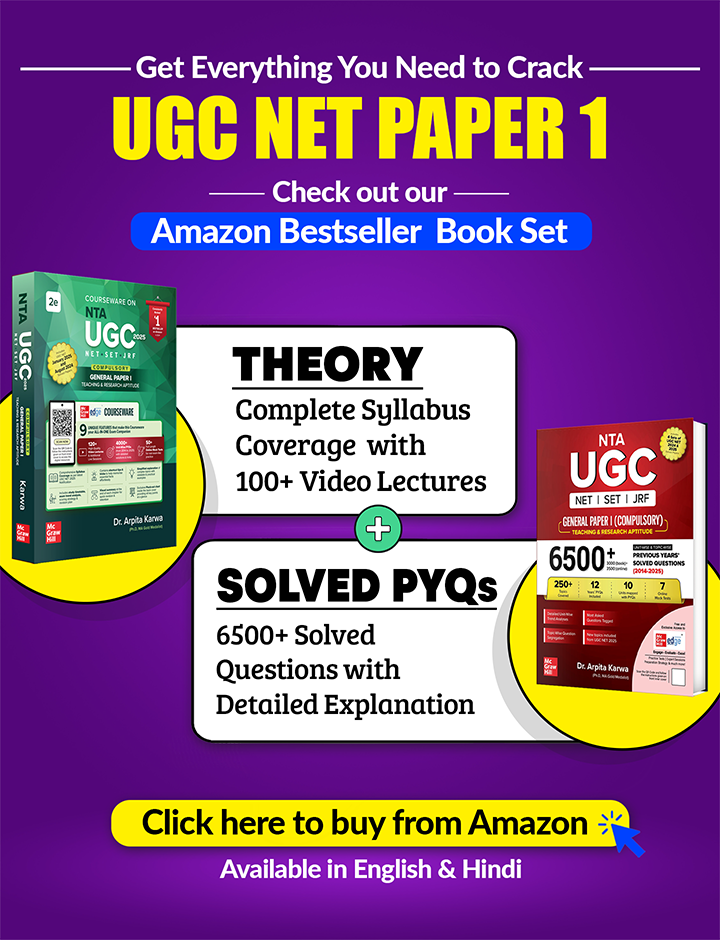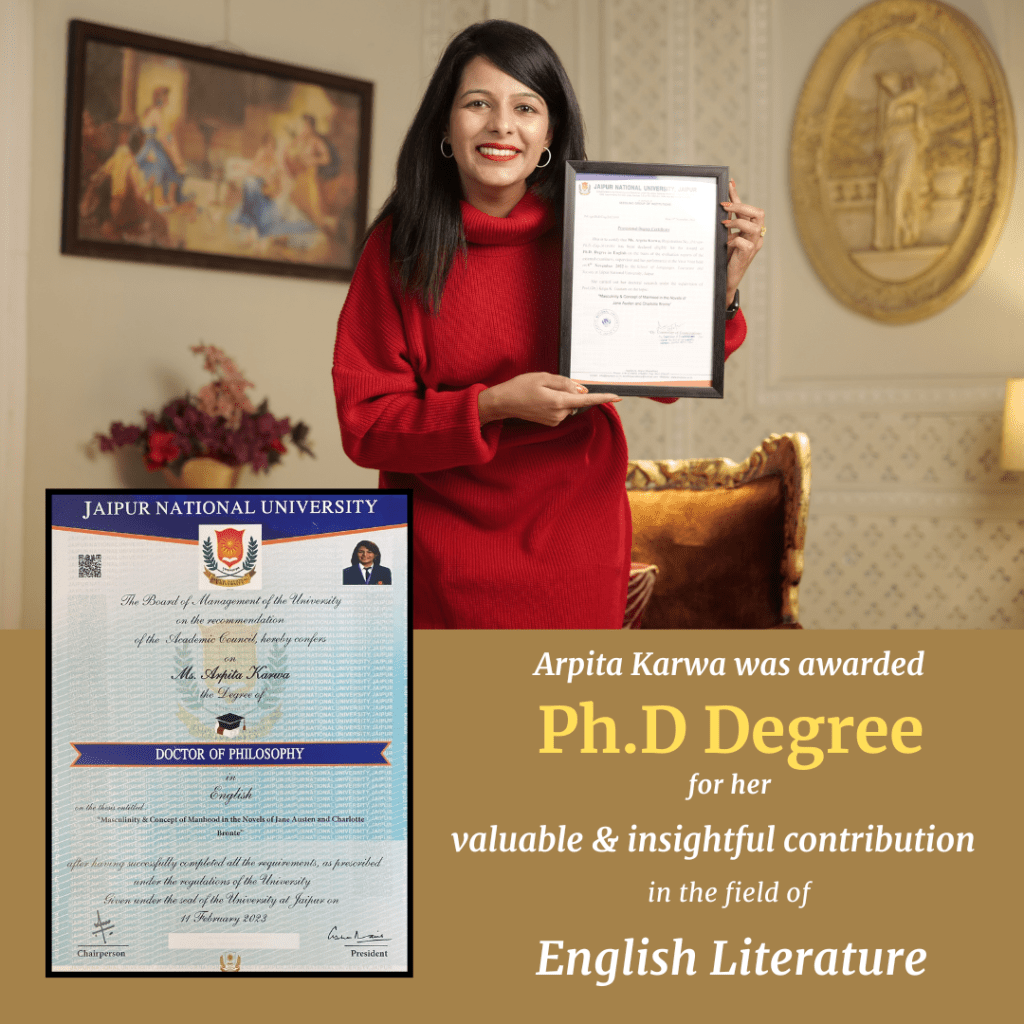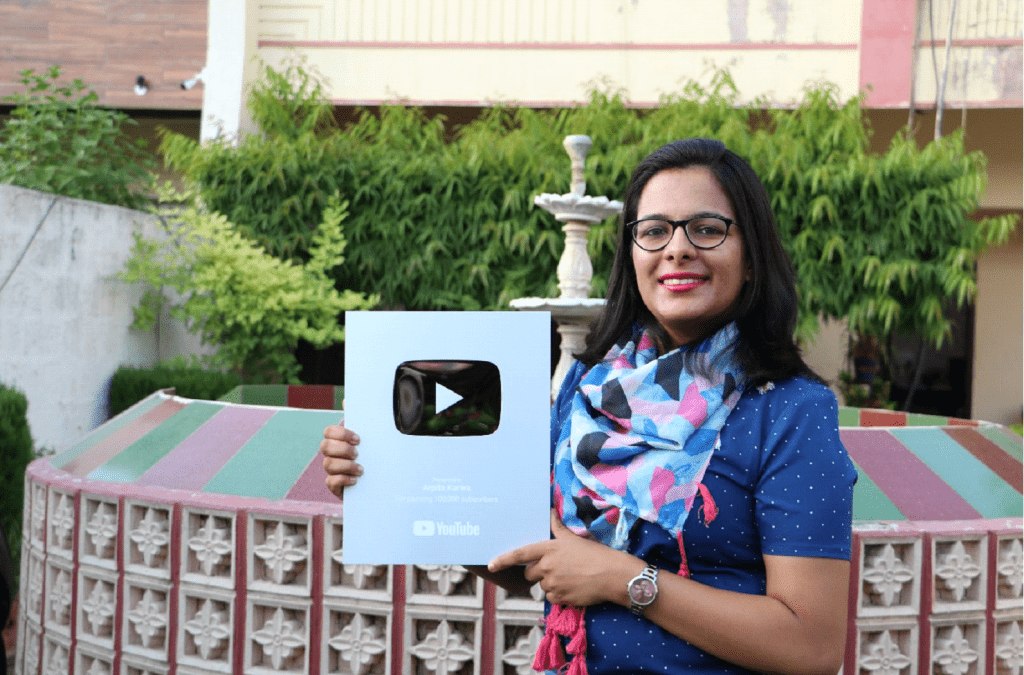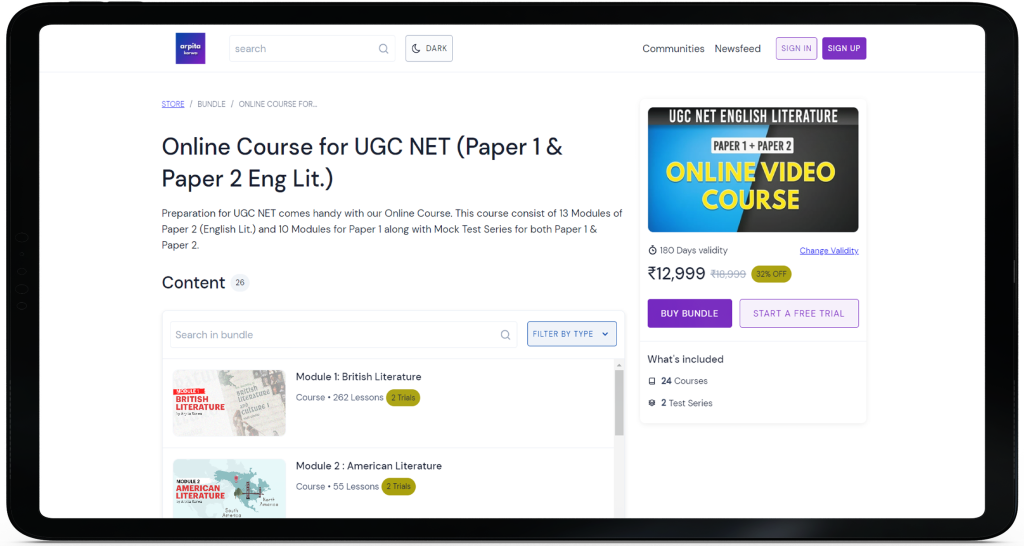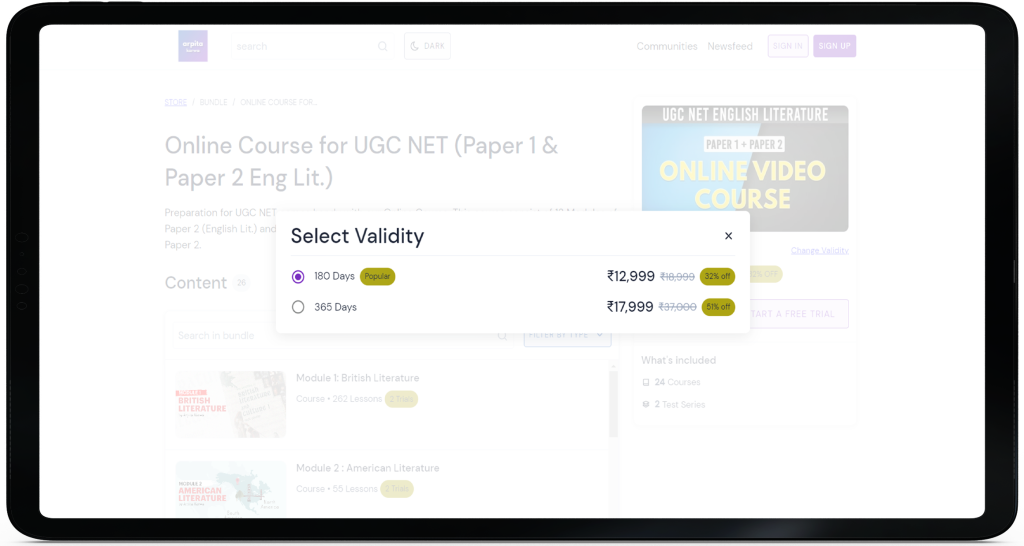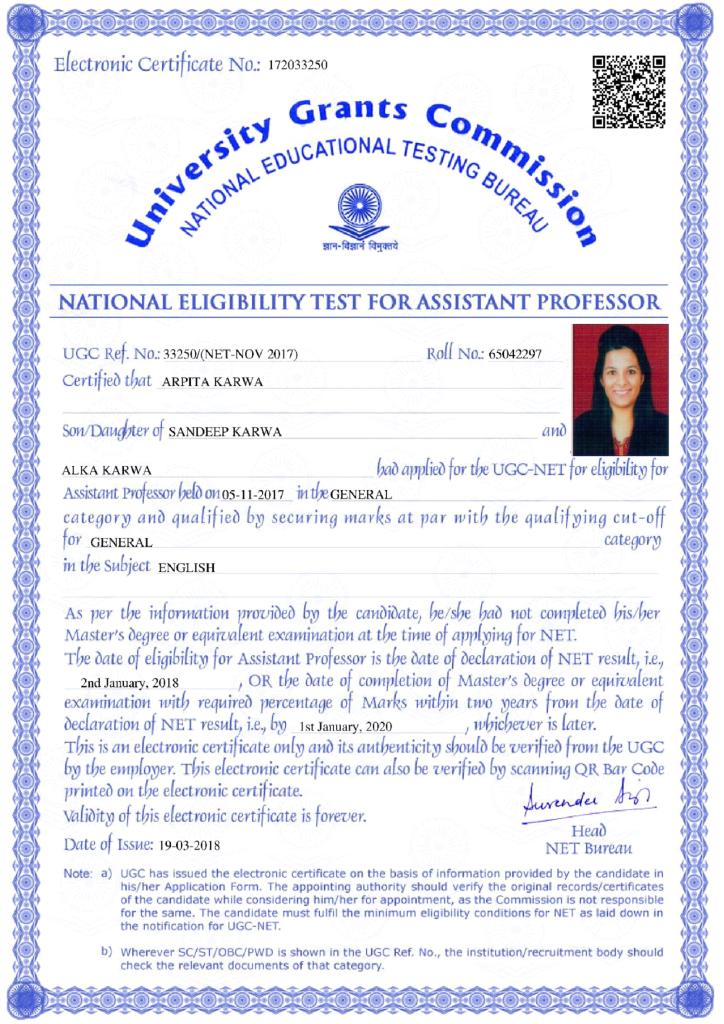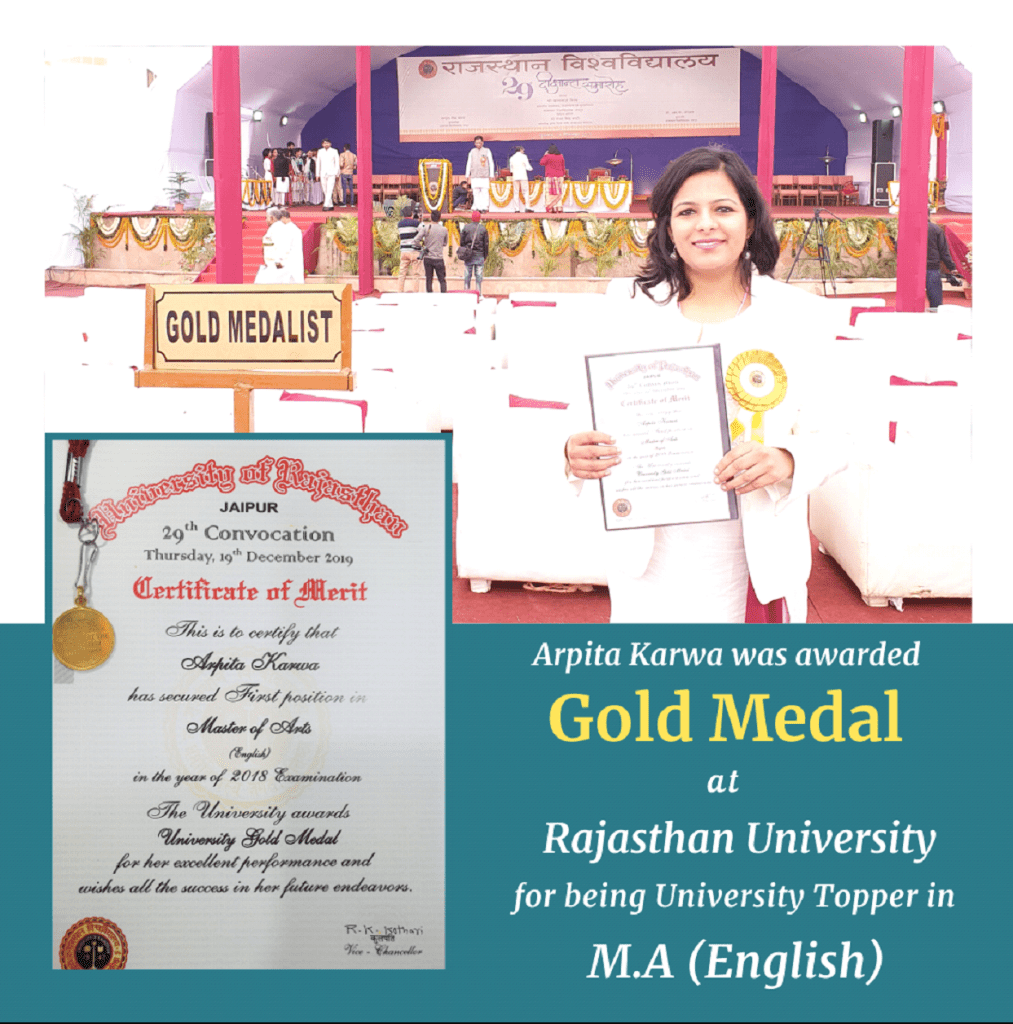UGC NET Paper 1 November 2021 (Conducted on 30th November 2021 : Morning Shift)
October 18, 2022 2025-08-18 16:14UGC NET Paper 1 November 2021 (Conducted on 30th November 2021 : Morning Shift)
November 2021: Paper 1 (Conducted on 30th Nov 2021 : Morning Shift)
Q. 1-5)
Q.1) What is the average number of vacant seats of B. Tech for years (2016-2020)?
[1] 14
[2] 15
[3] 16
[4] 17
Correct Answer: 1
Q.2) Which course has the highest percentage increase in enrolment of students from 2016-2017?
[1] BTech
[2] MTech
[3] MPhil
[4] MBA
Correct Answer: 3
Q.3) Find out the difference between average vacant seats of M Tech and MBA for 2016-2020.
[1] 2.4
[2] 2.5
[3] 2.6
[4] 2.7
Correct Answer: 3
Q.4) Which year has highest average enrollment?
[1] 2017
[2] 2018
[3] 2019
[4] 2020
Correct Answer: 3
Q.5) Which year has the minimum vacant seats?
[1] 2016
[2] 2017
[3] 2018
[4] 2019
Correct Answer: 4
Q.6) Who proposed theory of meaningful verbal learning?
[1] Benjamin Bloom
[2] Jerome Bruner
[3] Lawrence Kohlberg
[4] David Ausubel
Correct Answer: 4
Q.7) The steps involved in developing a performance test are
A. Develop an observation/rating form.
B. Try out the test items before developing a final form.
C. Conduct a job (task) analysis to determine what abilities are to be tested.
D. Develop an administration format
E. Develop some type of task-sampling plan.
[1] A, D, B, C, E
[2] C, A, E, D, B
[3] D, B, C, E, A
[4] B, C, D, A, E
Correct Answer: 2
Q.8) Statement I: As per Piaget’s stages of cognitive development, the child learns a language and begins to use symbols to represent objects during the pre-operational stage.
Statement Il: As per Piaget’s stages of cognitive development, the child learns through reflexes, senses and movement-actions on the environment during the formal operational stage.
[1] Both Statement I and Statement Il are true
[2] Both Statement I and Statement Il are false
[3] Statement I is true but Statement Il is false
[4] Statement I is false but Statement Il is true
Correct Answer: 3
Q.9) Identify the correct set of key mandate areas of the National Knowledge Commission
A. Access
B. Concepts
C. Delivery
D. Applications
E. Services
[1] A, B, C and D only
[2] B, C, D and E only
[3] A, B, D and E only
[4] A, C, D and E only
Correct Answer: 3
Q.10) Match the column:
A. e-Gyankosh
B. e-Pathshala
C. NROER
D. NDL
I. Open learning education resources developed by NCERT in 2013
II. digital repository of learning resources developed by ODL institutions
III. Educational e-resources developed by NCERT in 2015
IV. Virtual repository of learning resources with single window search facility developed by IIT, Kharagpur
[1] A-IV B-II C-III D-I
[2] A-II B-I C-IV D-II
[3] A-III B-I C-IV D-II
[4] A-I B-IV C-II D-III
Correct Answer: 2
Q.11) The concept “paradigm” is associated with:
[1] Karl Popper
[2] R. A. Fisher
[3] Imre Lakatos
[4] T.S. Kuhn
Correct Answer: 4
Q.12) Which among the following is a software for the analysis of qualitative data?
[1] SPSS
[2] R
[3] NVivo
[4] STATA
Correct Answer: 3
Q.13) Following are the objections against mixed methods research:
A. Quantitative and qualitative research are epistemologically different
B. Quantitative research is better than the qualitative research
C. Aims of quantitative and qualitative research are different
D. Ontological assumptions of quantitative and qualitative research may be different
E. Quantitative and qualitative research are paradigmatically incompatible
[1] A, B, C and D only
[2] B, C, D and E only
[3] A, C, D and E only
[4] A, B, D and E only
Correct Answer: 3
Q.14) Match the column:
A. Constant
B. Semiotics
C. Sample
D. Focus group
I. a mode of interview whereby there are several participants with an emphasis on the questioning on tightly defined topic
II. the segment of the population selected for research
III. an attribute ib terms of which cases do not differ
IV. an approach to the analysis of documents and other phenomenon
[1] A-III B-IV C-II D-I
[2] A-II B-III C-I D-IV
[3] A-I B-III C-II D-IV
[4] A-IV B-I C-II D-III
Correct Answer: 1
Q.15) Statement I: Questionnaires are filled in by the participants themselves.
Statement II: Interview schedule is filled in by the interviewer/researcher.
[1] Both Statement I and Statement Il are correct
[2] Both Statement I and Statement II are incorrect
[3] Statement I is correct but Statement Il is incorrect
[4] Statement I is incorrect but Statement Il is correct
Correct Answer: 1
Q.16) The Latin words “Communis” or “Communicare” from which the term “Communication” is derived, means:
[1] Provide specific information
[2] Make something uncommon
[3] Make common, the information available
[4] Produce information
Correct Answer: 3
Q.17) Power and status are said to cause ____ barriers in communication.
[1] Technological
[2] Cultural
[3] Physical
[4] Semantic
Correct Answer: 4
Q.18) A class conducted on Google Meet in which students and teachers are engaged in discussion in an instance of:
[1] Intrapersonal communication
[2] Group communication
[3] Mass communication
[4] Downward communication
Correct Answer: 2
Q.19) Being a smart consumer of media means:
[1] Following a few select TV channels one likes
[2] Belief in a few mass media channels
[3] Disbelief in messages received
[4] Being adept at recognizing subtle and not subtle forms of messages
Correct Answer: 4
Q.20) Assertion A: Two fundamental features of classroom communication are classroom instruction and classroom management.
Reason R: The classroom communication of teachers rests on the principle of edutainment.
[1] Both A and R are correct and R is the correct explanation of A
[2] Both A and R are correct but R is NOT the correct explanation of A
[3] A is correct but R is not correct
[4] A is not correct but R is correct
Correct Answer: 2
Q.21) The unit digit of the product of first 22 natural number is
[1] 0
[2] 2
[3] 4
[4] 6
Correct Answer: 1
Q.22) Which of the following statements are correct?
A. The average of first twenty multiples of 8 is 84
B. There are 25 prime numbers between 100 to 200.
C. Average of ten positive numbers is X. If each number is increased by 10%, then new average increases by 11%.
[1] A only
[2] B and C only
[3] A and B only
[4] A and C only
Correct Answer: 1
Q.23) Statement I: The single discount equivalent to a series discount of 10 %, 30 % and 50 % is 68.5%
Statement II: The single discount equivalent to a series discount of 10 %, 20 % and 40 % is 43.2%
[1] Both Statement I and Statement Il are true
[2] Both Statement I and Statement II are false
[3] Statement I is true but Statement I is false
[4] Statement I is false but Statement Il is true
Correct Answer: 3
Q.24) Assertion A: In a valid categorical syllogism, the middle term must be distributed in at least one premise.
Reason R: The conclusion of a valid argument cannot assert any more than is contained in the premises.
[1] Both A and R are correct and R is the correct explanation of A
[2] Both A and R are correct but R is NOT the correct explanation of A
[3] A is correct but R is not correct
[4] A is not correct but R is correct
Correct Answer: 2
Q.25) Which of the following statements are correct?
A. A proposition and E proposition are contradictories
B. A proposition and O proposition are contradictories
C. E proposition and O proposition are contradictories
D. I proposition and O proposition are contraries
E. I proposition and O proposition are subcontraries
[1] A, D and E only.
[2] A, C and D only
[3] B and D only
[4] B and E only
Correct Answer: 4
Q.26) Identify the fallacy committed in the argument:
“The policies suggested by him have no merit since he was once charged with embezzlement”.
[1] Argument ad Hominem (abusive)
[2] Argument from Ignorance
[3] Appeal to Pity
[4] Appeal to Inappropriate Authority
Correct Answer: 1
Q.27) “A young child goes near an iron ball, feels the radiation of heat; from that she concludes that the ball must be quite hot and returns without physically touching the ball.” Here the cognition is through:
[1] Perception
[2] Knowledge through analogical reasoning
[3] Inference
[4] Verbal authority
Correct Answer: 3
Q.28) Statement I: Asamavyapti corresponds to the Universal Affirmative proposition.
Statement II: Samavyapti corresponds to the Universal Negative proposition.
[1] Both Statement I and Statement Il are true
[2] Both Statement I and Statement Il are false
[3] Statement I is true but Statement Il is false
[4] Statement I is false but Statement Il is true
Correct Answer: 1
Q.29) The Ethernet is-
[1] A program that identities and moves traffic across local segments
[2] A protocol designed for wireless MANs
[3] A system that connects a number of computers or devices together to form a LAN
[4] A device that can communicate with another computer
Correct Answer: 3
Q.30) The Trojan horses-
[1] Search automatically for an item on the internet
[2] Are viruses that can replicate themselves
[3] A software that gathers information by monitoring
[4] Are malicious programs often disguised as legitimate software
Correct Answer: 4
Q.31) Statement I: Data bus sends data between the processor, memory unit and the /0 devices.
Statement II: It is uni-directional
[1] Both Statement I and Statement Il are true
[2] Both Statement I and Statement II are false
[3] Statement I is true but Statement II is false
[4] Statement I is false but Statement Il is true
Correct Answer: 3
Q.32) Following are some statements regarding the firewalls. Choose the correct statements
A. Examine traffic between computer and a network
B. Used to verify that data comes from a secure and trusted source
C. Use the concept of digital signature
D. Keep a list of IP addresses thus preventing access to certain websites
[1] B and C only
[2] C and D only
[3] A and D only
[4] A and C only
Correct Answer: 3
Q.33) Match the column:
A. Hacking
B. Phishing
C. Spyware
D. Spam
I. ‘clog-up’ a user’s inbox with unwanted emails
II. gives the originator access to all data entered by the keyboard
III. identity fraud
IV. illegal use of personal data
[1] A-I B-III C-II D-IV
[2] A-IV B-III C-II D-I
[3] A-IV B-I C-III D-II
[4] A-II B-IV C-III D-I
Correct Answer: 2
Q.34) Match the column:
A. Ignitable
B. Corrosive
C. Reactive
D. Toxic
I. very unstable
II. causes serious health issues
III. destroy containers
IV. able to sustain combustion
[1] A-I B-II C-IV D-III
[2] A-IV B-III C-II D-I
[3] A-IV B-III C-I D-II
[4] A-I B-IV C-II D-III
Correct Answer: 3
Q.35) Anaerobic digestion of sewage sludge is
A. An effective process for organic solids
B. This process requires lots of energy
C. This process generates methane as an end product
D. Digested sludge is reduced in volume and easily dewatered
E. Very fast process and thus does not require large sized reactors
[1] B, C, D and E only
[2] A, B and C only
[3] A, C, D and E only
[4] A, C and D only
Correct Answer: 4
Q.36) Statement I: Toxic chemicals often injure organs as well as organ systems
Statement II: Hepatotoxins are chemicals that can damage kidneys
[1] Both Statement I and Statement Il are true
[2] Both Statement I and Statement II are false
[3] Statement I is true but Statement II is false
[4] Statement I is false but Statement Il is true
Correct Answer: 3
Q.37) Match the column:
A. Goal 1
B. Goal 2
C. Goal 3
D. Goal 4
I. promote gender equality and empower women
II. reduce child mortality
III. eradicate extreme poverty and hunger
IV. achieve universal primary education
[1] A-III B-IV C-I D-II
[2] A-I B-III C-II D-IV
[3] A-II B-IV C-III D-I
[4] A-IV B-II C-I D-III
Correct Answer: 1
Q.38) Assertion A: Coastlines are considered as high potential areas for wind energy generation.
Reason R: Ocean water can be utilized as coolant during wind energy production
[1] Both A and R are correct and R is the correct explanation of A
[2] Both A and R are correct but R is NOT the correct explanation of A
[3] A is correct but R is not correct
[4] A is not correct but R is correct
Correct Answer: 2
Q.39) In the ancient Buddhist system of education, the student after being admitted to a monastery had to renounce all the worldly and family relationships. This was termed as
[1] Pravajya
[2] Upsampuda
[3] Samvartan
[4] Upnayan
Correct Answer: 1
Q.40) AICTE is not dealing with the maintenance of standards in which one of the following areas?
[1] Hotel Management
[2] Town Planning
[3] Pharmacy
[4] Nursing
Correct Answer: 4
Q.41) Statement I: The Wood’s Dispatch recognised for the first time that the government should give frank and cordial support to female education and take effective measures for its expansion
Statement II: Girl candidates were allowed to appear in the matriculation examination for the first time by Calcutta University
[1] Both Statement I and Statement Il are true
[2] Both Statement I and Statement II are false
[3] Statement I is true but Statement I is false
[4] Statement I is false but Statement Il is true
Correct Answer: 1
Q.42) The NEP-2020 envisions higher education as
A. playing an important role in promoting human as well as societal well being
B. enabling system for personal accomplishments with no economic contribution to society or public engagement
C. a system with less emphasis on development of cognitive skills and achieving learning outcomes
D. a system with identified sets of skills and values to be incorporated at each stage of learning from pre school to higher education
E. a system which needs complete overhaul and energising to overcome the challenges faced by the system
[1] A, B and C only
[2] B, C and D only
[3] C, D and E only
[4] A, D and E only
Correct Answer: 4
Q.43) Match the column:
A. Central Institute of English and Foreign Languages
B. Gramodaya Vishwa Vidyalaya
C. Central Institute of Tibetan Studies
D. Indian Institute of Science
I. Chitrakoot
II. Hyderabad
III. Bangalore
IV. Dharmshala
[1] A-I B-III C-IV D-II
[2] A-III B-IV C-II D-I
[3] A-II B-I C-IV D-III
[4] A-IV B-I C-III D-II
Correct Answer: 3
Q.44-48) Read RC Passage to Answer:
Most of the people who appear most often and most gloriously in the history books are great conquerors, generals and soldiers, whereas the people who really helped civilization forward are often never mentioned at all. We do not know who first set a broken leg, or launched a seaworthy boat, or calculated the length of the year, or manured a field, but we all know all about the killers and destroyers. People think a great deal of them, so much so that on all the highest pillars in the great cities of the world you will find the figure of a conqueror or a general or a soldier. Most people believe that the greatest countries are those that have beaten in battle, the greatest number of other countries and ruled over them as conquerors. It is just possible they are, but they are not the most civilized. Animals fight; so do savages; hence to be good at fighting is to be good in the way in which an animal or a savage is good, but it is not to be civilized. Even being good at getting other people to fight for you and telling them how to do it most efficiently- this, after all, is what conquerors and generals have done-is not being civilized. People fight to settle quarrels. Fighting means killing and civilized people ought to be able to find some way of settling their disputes other than by seeing which side can kill off the greater number of the other side and then saying that, that side which has killed most has won. And not only has won, but because it has won, has been in the right. For that is what going to war means; it means saying that might is right.
Q.44) In the first sentence, the author says that:
[1] Most history books were written by conquerors, generals and soldiers
[2] No one who really helped civilization forward is mentioned in any history book
[3] History books tell us far more about conquerors and soldiers than about those who helped civilization forward
[4] Conquerors, generals and soldiers should not be mentioned in history
Correct Answer: 3
Q.45) On all the highest pillars in the great cities of the world, we find:
[1] the figure of the same conqueror or general or soldier
[2] the figure of some conqueror or general or soldier
[3] a figure representing the number of conquerors, generals and soldiers in that country
[4] the figure of a person who helped civilization forward
Correct Answer: 2
Q.46) Most people believe that the greatest countries are:
[1] those that built the highest pillars
[2] those that were beaten in battle by the greatest number of other countries
[3] those that defeated a few countries
[4] those that won the greatest number of battles against other countries
Correct Answer: 4
Q.47) In the author’s opinion, the countries that ruled over a large number of other countries are:
[1] certainly not the greatest in any way
[2] neither the greatest nor the most civilized
[3] possibly the most civilized but not the greatest
[4] possibly the greatest in some sense but not the most civilized
Correct Answer: 4
Q.48) “That is what going to war means; it means saying that might is right”, The meaning of this sentence is that:
[1] The winner is right and the loser wrong
[2] Only those who are powerful should go to war
[3] Those who are right should fight against those who are wrong
[4] In a war only those who are powerful will win
Correct Answer: 1
Address
Bani Park, Jaipur, Rajasthan 302016
contact@arpitakarwa.com
Contact
Connect with us




Courses
Quick Links
Don’t waste time browsing several apps. The only app you need for your Exam Preparation is here!













